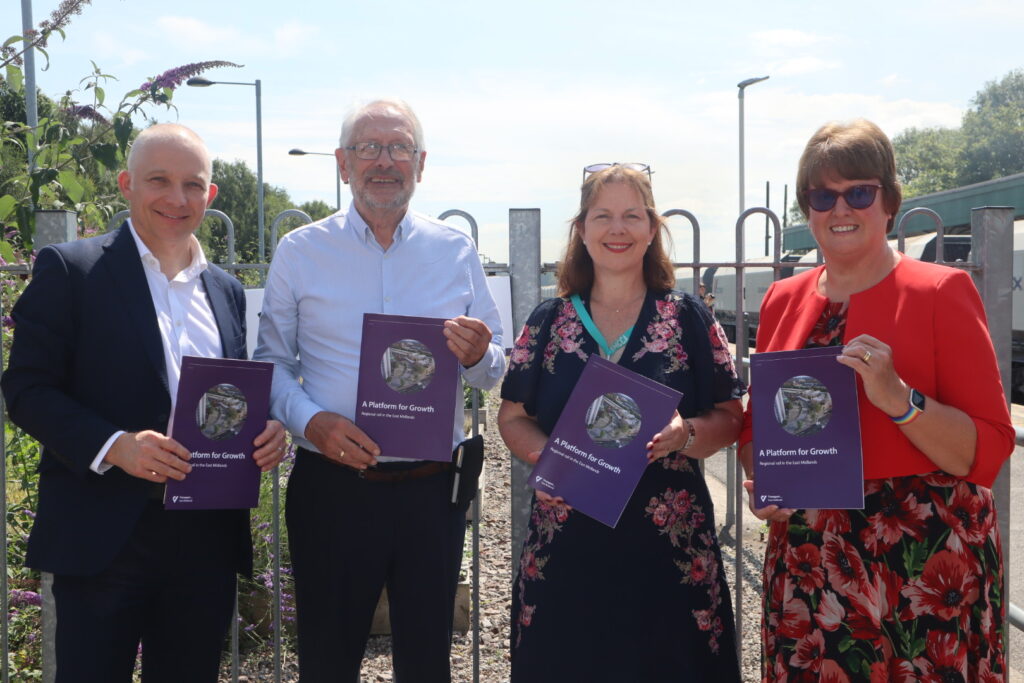CALLS FOR IMPROVEMENTS TO ‘SPARSE AND UNDERFUNDED’ RAIL SERVICES IN THE EAST MIDLANDS

Leaders across the East Midlands region have come together to call for a long-term plan for improving regional rail services following a report from Transport for the East Midlands (TfEM) that shines a spotlight on the opportunity to improve regional rail services.
The report, titled “A Platform for Growth”, highlights the need to develop a more competitive rail offer in the East Midlands, improve performance standards, and for an East Midlands voice within the new Great British Railways.
Sir Peter Soulsby, City Mayor of Leicester and Chair of TfEM said: “Our evidence suggests that regional rail services in the East Midlands are directly worth around £356 million per year to our regional economy. We have major population growth forecast and exciting local plans for many more new jobs and homes.
“Due to years of underinvestment, the East Midlands rail network is sparse and infrequent compared to other regions. This inevitably impacts on punctuality and the ability to run the level of services the region requires.
“Around 75% of stations in the East Midlands are served by just one train per hour or fewer, with even lower levels of service levels on Sundays and increasingly overcrowded trains on Saturdays.
“But it doesn’t have to be this way.
“We need to see a new clear plan for growth for this region in terms of both services and performance. The rail industry cannot ‘cut itself’ to financial sustainability – it must grow patronage to survive, and the East Midlands is a great place to start!”
Claire Ward, Mayor of the East Midlands, said: “Rail is proudly embedded in the culture of our region, yet there is so much more room for improvement when it comes to infrastructure and regional services in the East Midlands.
“Our regional rail network doesn’t yet match the ambition of our towns and cities. Commuters, local communities and business can see what rail investment has done elsewhere and rightly expect the same standards here.
“If we’re going to reduce the number of car journeys and meet our climate goals, we need to boost sustainable travel by investing in our rail network and making sure commuters are getting a fair deal. If we get this right, we could unlock tens of millions of pounds of direct economic benefits.”
Councillor Tricia Gilby, leader of Chesterfield Borough Council, said: “Chesterfield Railway Station is one of the busiest in the East Midlands and of vital importance to unlocking the economic potential of our borough and the wider economies of north Derbyshire and the Peak District.
“We need our train services to be catalysts for growth bringing more and better jobs to our economies, stimulating inward investment, enabling social mobility and introducing new audiences to the area’s visitor attractions.
“To achieve this, there needs to be investment in our stations, better quality trains, more frequent and reliable services, and fare structures that encourage people to leave their cars at home.”
Will Rogers, Managing Director at East Midlands Railway, said:“Although our regional fleet is undergoing a major £28.2 million refurbishment, the East Midlands transport spend per head has been significantly below the UK average level for all of the last 25 years.
“We are keen to work in partnership with Transport for the East Midlands, our mayors and other stakeholders to improve this situation. Rail is a key enabler of economic and social value and for our region to compete, grow and meet the ambitions of its citizens, greater investment in rail infrastructure and services is vital.”